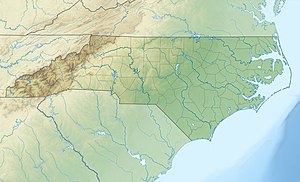Mill Creek (Coddle Creek tributary)
Appearance
| Mill Creek Tributary to Coddle Creek | |
|---|---|
| Location | |
| Country | United States |
| State | North Carolina |
| County | Cabarrus Rowan |
| Physical characteristics | |
| Source | Irish Buffalo Creek divide |
| • location | Enochville, North Carolina |
| • coordinates | 35°32′21″N 080°40′20″W / 35.53917°N 80.67222°W[1] |
| • elevation | 870 ft (270 m)[2] |
| Mouth | Coddle Creek |
• location | about 3 miles southwest of Kannapolis, North Carolina within Coddle Creek Reservoir |
• coordinates | 35°26′32″N 080°42′22″W / 35.44222°N 80.70611°W[1] |
• elevation | 646 ft (197 m)[2] |
| Length | 7.89 mi (12.70 km)[3] |
| Basin size | 8.25 square miles (21.4 km2)[4] |
| Discharge | |
| • location | Coddle Creek |
| • average | 9.74 cu ft/s (0.276 m3/s) at mouth with Coddle Creek[4] |
| Basin features | |
| Progression | Coddle Creek → Rocky River → Pee Dee River → Winyah Bay → Atlantic Ocean |
| River system | Pee Dee River |
| Tributaries | |
| • left | unnamed tributaries |
| • right | unnamed tributaries |
| Waterbodies | Coddle Creek Reservoir |
| Bridges | Enochville School Road, Smith Road, Russell Farm Road, Wright Road, Tuckaseegee Road, Mooresville Road, Stirewalt Road |
Mill Creek is a 7.89 mi (12.70 km) long 1st order tributary to Coddle Creek in Cabarrus County, North Carolina.
Course
[edit]Mill Creek rises in Enochville, North Carolina and then flows south to join Coddle Creek within Coddle Creek Reservoir about 3 miles southwest of Kannapolis.[2]
Watershed
[edit]Mill Creek drains 8.28 square miles (21.4 km2) of area, receives about 46.7 in/year of precipitation, has a wetness index of 442.55, and is about 45% forested.[4]
References
[edit]- ^ a b "GNIS Detail - Mill Creek". geonames.usgs.gov. US Geological Survey. Retrieved 12 November 2020.
- ^ a b c "Get Maps". USGS Topoview. US Geological Survey. Retrieved 12 November 2020.
- ^ "ArcGIS Web Application". epa.maps.arcgis.com. US EPA. Retrieved 12 November 2020.
- ^ a b c "Mill Creek Watershed Report". US EPA Geoviewer. US EPA. Retrieved 12 November 2020.


